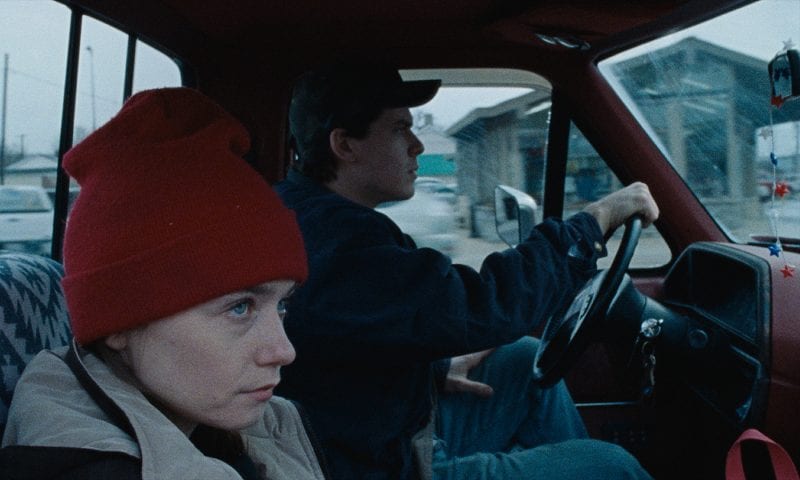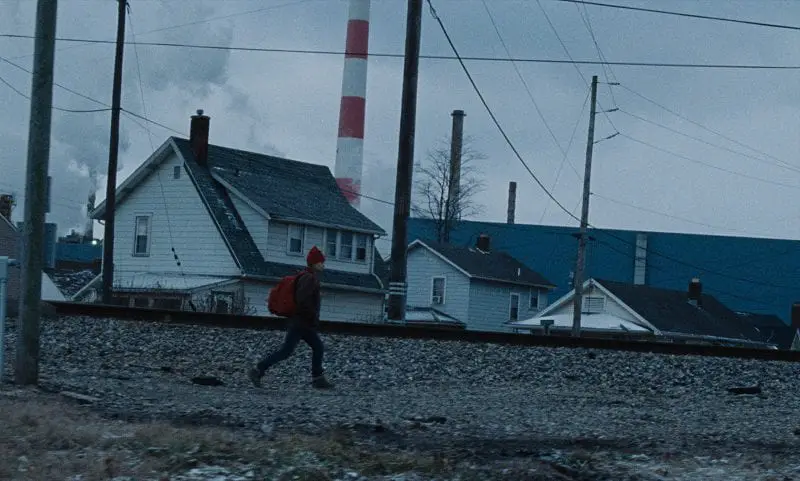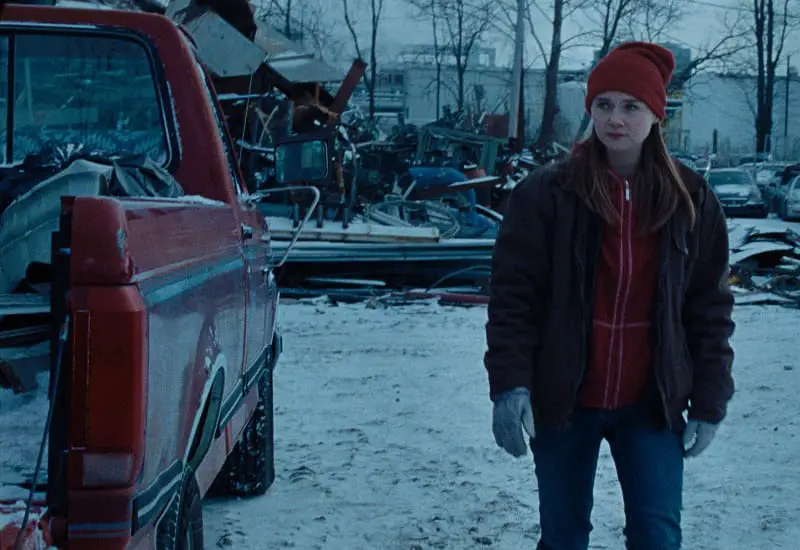Set in the backwoods and scrapyards of modern-day southern-Ohio Appalachia, Nicole Riegel’s Holler deserves a shout-out. Released simultaneously in theaters and on demand, Holler’s tale is one that takes the full measure of its troubled time and place, charting the toll taken on those whose situations are bleak and prospects bleaker. Trump’s mediated voice, touting “Jobs, jobs, jobs,” practically taunts Riegel’s characters, who live on the precipice of plant closings, housing evictions, opioid addiction, and eventual incarceration. Jobs are not only scarce but endangered and endangering. What’s the way out?
For Ruth, played by Jessica Barden (The End of the F*cking World, Lobster), it might be college. Except college costs money. Ruth lives in the care of older brother Blaze (Gus Halper) while their addicted mother Rhonda (Pamela Adlon) serves time in the local prison. Ruth may be poor, but she’s whip-smart with her wit and her tongue, clearly sharp enough for something other than the dead-end factory job her brother endures. She writes others’ take-home tests and pilfers copies of Flaubert from the school library. To make ends meet, Ruth and Blaze steal and sell aluminum cans, but it’s not enough to pay the rent, and a pileup of eviction notices makes more drastic action necessary. Shady scrap dealer Hark (Austin Amelio) suggests a risker, but far more profitable venture—scavenging and stealing more valuable metal for sale to Chinese brokers.

Holler tells a simple story but a highly effective one. Blaze wants Ruth to go to college, to find her way out of the holler, but she’s not persuaded. Her intelligence and acumen make her an especially valuable asset to Hark’s operation. Scrap, though, is dangerous stuff. It cuts, and people bleed. The bigger the score, the greater the risk. Midway through, the film’s narrative turns to neo-noir, taking its naïve protagonist into a dark and dangerous labyrinth of criminal activity and moral compromise. Debra Granik’s Winter’s Bone, a familial melodrama turned rural neo-noir, is a good point of comparison. Both feature willful young female protagonists on a quest for meaning in a rural, dangerous, and complex world of criminal activity.
Shot on 16mm film and featuring a supporting cast of local nonprofessional actors and working people, Holler’s aesthetic resembles the 1970s lo-fi look of New Hollywood like Five Easy Pieces, the Direct-Cinema documentaries of the Maysles brothers, or the independent lens of Robert M. Young’s ¡Alambrista! Images of the Southern Ohio landscapes are framed with a photographer’s eye for composition. The grainy, filmic look and handheld camerawork grants an access to the characters that feels remarkably intimate and never choreographed.
Director Riegel wrote the film’s script based in part on her own experience as a young girl growing up in Ohio. Before taking a film class at Wright State University and going on to earn her MFA in screenwriting from UCLA, Riegel served in the Army National Guard, just like other members of her family. Only later did she begin to consider seriously that her own experiences were worth telling. Just decades ago, the industry was almost completely averse to telling young women’s coming-of-age stories in earnest, often burying them with a lack of promotion or marketing them mainly as ditzy comedies—if making them at all.
But Holler makes sure such female characters’ plights are examined in full. The promise of a young mind like Ruth’s is not one our society can afford to waste. Like the recent documentary Jacinta demonstrates, the perils of Adverse Childhood Experiences simply exacerbate each other and make addiction, unemployment, and even incarceration all the more likely an outcome. In times like these, young women’s talents need the kind of education and mentorship Reigel received, and in telling the stories of characters like Holler‘s Ruth, Riegel is doing important work.

Shooting on film and during the harsh cold of winter, cinematographer Dustin Lane manages to capture a landscape that is decimated by economic downturn and find beauty in arrestingly compositions of scrap metal. Sparks of light flash and twists of cable turn in unpredictable and evocative imagery. It’s quite an accomplishment. Gene Back’s subtle, moody score helps create suspense and evoke effect when and as necessary, and the drone of scrap-metal machinery makes for an unsettling aural setting.
The cast—with the British Barden a seasoned, savvy veteran actor at 28 carrying the load in every scene—is excellent throughout. As Linda, Blaze’s factory co-worker and Ruth’s surrogate mom, Becky Ann Baker is marvelous in just a few scenes. Like Barden, she, Adler, Halper, and Amelio are all top-notch. The supporting cast of local factory and scrapyard workers lends a neorealist authenticity to the Appalachian setting.

Getting Appalachian stories “right” isn’t easy (as Hillbilly Elegy and other poverty porn makes obvious), but Holler looks and feels as devoid of artifice as a fiction film can. Without spoiling its plot, I’ll note that Holler concludes on a note of some optimism and ambiguity. Having spent 90 minutes in the company of Barden’s spirited, intelligent, resourceful young protagonist, I’d be delighted to see more of her narrative—or of other young women like her—onscreen. And I hope Reigel’s success will inspire other women from similar backgrounds to tell their stories. In the meantime, her Holler is a brilliant new film worth every bit of your attention.



